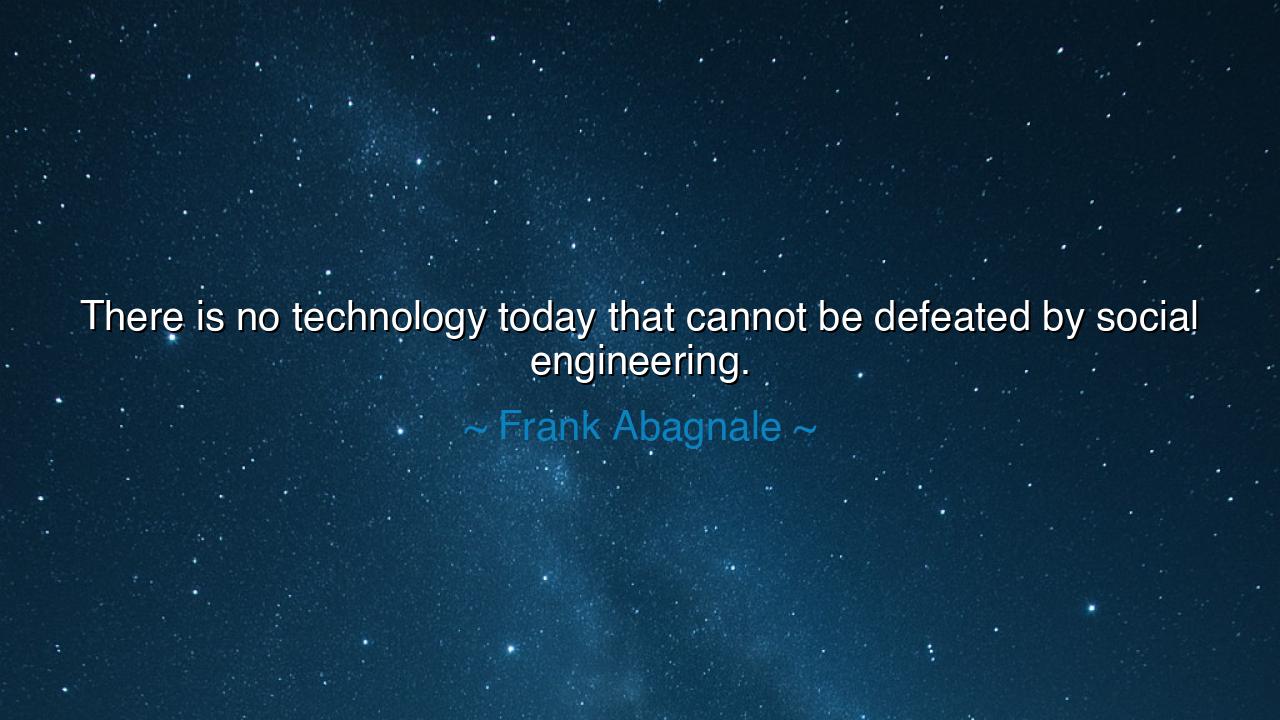
There is no technology today that cannot be defeated by social






Hear the sobering words of Frank Abagnale, once a deceiver, later a teacher of truth: “There is no technology today that cannot be defeated by social engineering.” This is no idle warning, but a truth carved from experience. For Abagnale, who once outwitted banks, airlines, and governments with nothing but charm and cunning, speaks as one who knows the frailty of systems. He reminds us that the strongest lock is useless if the keeper can be tricked into opening the door, and that the weakness of mankind is not in machines, but in the human heart.
Technology, in its brilliance, builds walls, encrypts secrets, guards treasures with codes and sensors. Yet all these defenses, mighty though they appear, share one vulnerability: they are operated by people. And people can be deceived. Social engineering is the ancient art of persuasion twisted toward manipulation. It is the weapon that bypasses the gate, not by breaking it, but by convincing the guard to open it willingly. Thus Abagnale reveals a paradox: that even in an age of astonishing invention, the oldest tricks of guile still prevail.
History has shown this pattern again and again. Consider the fall of Troy. For ten long years the Greeks could not breach its walls, fortified and strong. But by cunning they offered the great wooden horse, a gift that seemed a token of peace. The Trojans, swayed by pride and curiosity, opened their gates and pulled the doom of their city inside. No ram, no siege engine, no weapon of technology toppled Troy—it was social engineering, the deception of human trust, that brought the city to ruin.
In Abagnale’s own life, this truth played out vividly. As a young man, he forged checks and assumed false identities, posing as pilot, doctor, and lawyer. He had no advanced tools, no modern technology, only confidence, persuasion, and the boldness to exploit human trust. He did not need to break machines; he needed only to convince people to hand him what he wanted. Later, when he turned his knowledge toward justice, he taught banks and governments that their greatest weakness was not their machines, but their people.
This is why his words are so urgent. They teach us that no matter how advanced our systems become, the human factor remains the ultimate key. Social engineering preys on greed, on fear, on trust, on the longing to be helpful or the fear of authority. It is not firewalls and algorithms that are defeated, but the very emotions that make us human. And unless those emotions are disciplined, the mightiest fortress will crumble from within.
The lesson for us is clear: Guard your mind as carefully as you guard your passwords. Do not believe that technology alone can keep you safe. Question the voice that urges haste, the stranger that demands trust without proof, the authority that commands obedience without reason. Learn discernment, for the first line of defense is not the machine, but the soul that operates it.
Practical wisdom stands before you: Educate yourself and others in vigilance. Test not only your systems, but your people, training them to recognize deception. Build habits of caution—verify before you trust, pause before you act, and remember that kindness need not mean gullibility. For while social engineering can topple technology, it cannot so easily defeat a mind trained in awareness and discipline.
So let Abagnale’s words be remembered: no technology is invincible, but wisdom and vigilance can guard what machines cannot. The ancient city fell to a lie, the modern bank to a con. Yet the wise, who temper trust with caution, who strengthen the heart as well as the system, shall stand secure. For it is not the machine that saves us, but the marriage of technology with human discernment, patience, and courage.






AAdministratorAdministrator
Welcome, honored guests. Please leave a comment, we will respond soon